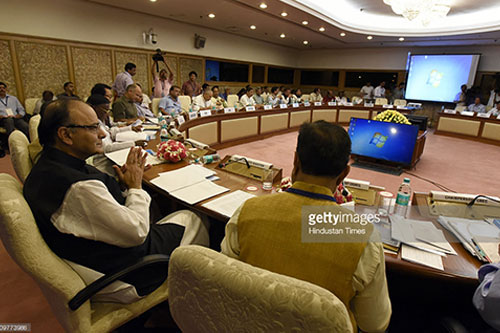GST Council meets to iron out differences, unlikely to meet 1 April 2017 roll-out deadline
Dated 24th December, 2016
 Sharing of power still continues to be the sticking point at the seventh two-day GST Council meeting that concluded on Friday.
Sharing of power still continues to be the sticking point at the seventh two-day GST Council meeting that concluded on Friday.
It is yet to be unanimously decided that under the Integrated Goods and Services Taxes (IGST) law, whether power can be shared with the states or the Centre shall have it exclusively.
This makes the long-pending GST roll-out deadline on 1 April 2017 increasingly unachievable. The two important issues – dual control and cross empowerment issues continue to be pending.
All eyes are now on the post-New Year GST Council meeting to be held on 3 and 4 January 2017.
Even during the fifth GST Council meeting on 3 and 4 December no unanimity could be reached on these two issues.
However, in a significant breakthrough in Friday’s meeting, primary drafts of CGST and model SGST, and the basic draft of compensation law got approved without many hurdles, before they could be tabled in Parliament.
"Primary drafts of CGST and model SGST laws have been unanimously passed. But, two aspects of the IGST law are yet to be decided. First, territory of the states to be decided and second, whether power can be shared with the states or Centre will have it," Finance Minister Arun Jaitley said after the Friday meeting.
As the day one of the two-day Council meet on Thursday ended with no discussion on dual control, it was hoped that in today’s (Day 2) meeting a unanimity could be achieved on the contentious issue over the dual control of assesses.
On the issue of cross empowerment, the government wants to weigh on the pros and cons of the issue to ensure a single interface under GST, which will subsume service tax, value-added tax (VAT), excise and other local levies.
The issue of dual control pertains to the issue of administration of transactions above Rs 1.5 crore. During the Council’s meeting held in September, it was decided that states would have exclusive jurisdiction over transactions below Rs 1.5 crore.
For transactions above Rs 1.5 crore, it was decided that dual audit by the Centre and the state would be conducted on that particular amount. This emerged as a hurdle in reaching unanimity on this issue.
Five state governments — Uttar Pradesh, West Bengal, Tamil Nadu, Kerala and Uttarakhand — have been asking for an exclusive control over small taxpayers below Rs 1.5 crore limit.
Meanwhile, the ghost of demonetisation appeared as a new road block for tax rollout during the fifth meeting.
West Bengal Chief Minister Mamata Banerjee strongly opposed the GST on the ground of demonetisation, as she had demanded the revoking of currency note ban.
"The next council meeting on 3 and 4 January will be important and we’re keeping fingers crossed as the issue of dual control will be debated, along with IGST law. Apart from this, a few state governments expressed concerns over the impact of demonetisation on state’s economy, which they think could have a cascading effect once GST is in place," a source, who was a part of today’s meeting told Firstpost.
Compensation to states for loss of revenue on account of implementation of GST was widely debated today.
"Andhra Pradesh does not accept levy of cess by the Centre on certain goods to compensate the states for loss of revenue arising out of implementation of GST in the five years starting from 2017-18. The FM during the Empowered Committee meeting held in Kolkata on 14 June had said that the central government was committed to compensate the states for loss of revenue on account of implementation of GST. The proposal to levy cess on certain goods, instead of compensating from the revenues of Consolidated Fund of India, is not at all justified. Instead, the compensation must be given from the Consolidated Fund only," said Andhra Pradesh, Finance Minister, Yanamala Ramakrishnudu.





